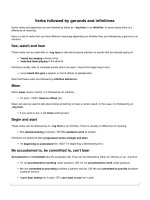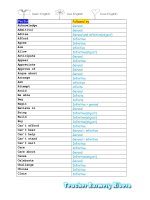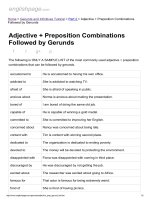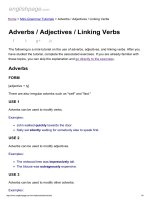ENGLISH PAGE verbs followed by nouns + infinitives
Bạn đang xem bản rút gọn của tài liệu. Xem và tải ngay bản đầy đủ của tài liệu tại đây (118.05 KB, 2 trang )
25/2/2016
ENGLISH PAGE Verbs Followed by Nouns + Infinitives
englishpage.com
Home > Gerunds and Infinitives Tutorial > Part 2 > Verbs Followed by Nouns + Infinitives
Verbs Followed by Nouns + Infinitives
f
t
g+
p
9 = verb followed by a gerund OR a noun + an infinitive
13 = verb followed by a gerund OR an infinitive with a difference in meaning
List 1: Verb + Required Noun + Infinitive
advise [9]
I advised them to see a doctor.
allow [9]
Ireland doesn't allow people to smoke in bars.
cause
He caused her to make a mistake.
convince
Ned convinced me to quit my job.
enable
Financial aid enabled the students to pay such expensive tuition fees.
encourage [9]
He encourages his patients to eat healthy foods.
force
The commander forced the soldiers to march in the rain.
get (cause to)
Isabelle got Mike to wash her car.
hire
Mr. Donelly hired Sarah to work as a receptionist.
invite
We invited them to join us.
order
The police ordered him to put his hands in the air.
permit [9]
California doesn't permit people to fish without a fishing license.
remind
They reminded me to pay the bills before the end of the month.
require [9]
The certificate requires students to complete two courses.
tell
He told me to shut up.
/>
1/3
25/2/2016
ENGLISH PAGE Verbs Followed by Nouns + Infinitives
urge [9]
They urge citizens to recycle bottles and paper.
warn
She warned him not to be late.
List 2: Verb + Optional Noun + Infinitive
Notice in the examples below that the verbs can be followed by an infinitive or a noun plus
an infinitive. When a noun is added, it usually changes who or what is performing the
action. To understand this better, look at the first verb "ask" and its examples. In the first
sentence, she is asking if she herself can leave. In the second sentence, she is requesting
that a man leave. Study the examples below and consider how the optional noun changes
the meaning.
ask
She asked to leave.
She asked him to leave.
choose
I chose to help out.
I chose him to help out.
expect
They expect to arrive early.
The expect him to arrive early.
need [13]
I need to clean the house.
I need her to clean the house.
prepare
They prepared to take the test.
They prepared her to take the test.
promise
She promised to stop smoking
She promised him to stop smoking.
threaten
He threatened to leave forever.
He threatened her to leave forever.
want
I want to study Spanish.
I want my son to study Spanish.
wish
I wish to stay.
I wish him to stay. rare form
would like
We would like to start now.
We would like him to start now.
Copyright © 2016 Englishpage.com, All Rights Reserved.
Contact us | Privacy Policy | Advertise with us
Your personal online English school. Learn English at Englishpage.com!
Weekly Lesson Grammar Book Vocabulary Verb Tenses Conditionals Modals
Gerunds / Infinitives Articles Prepositions Minitutorials Irregular Verbs Reading Room
Listening Lounge Games English Forums English Schools English · Foreign Dictionaries
/>
2/3









